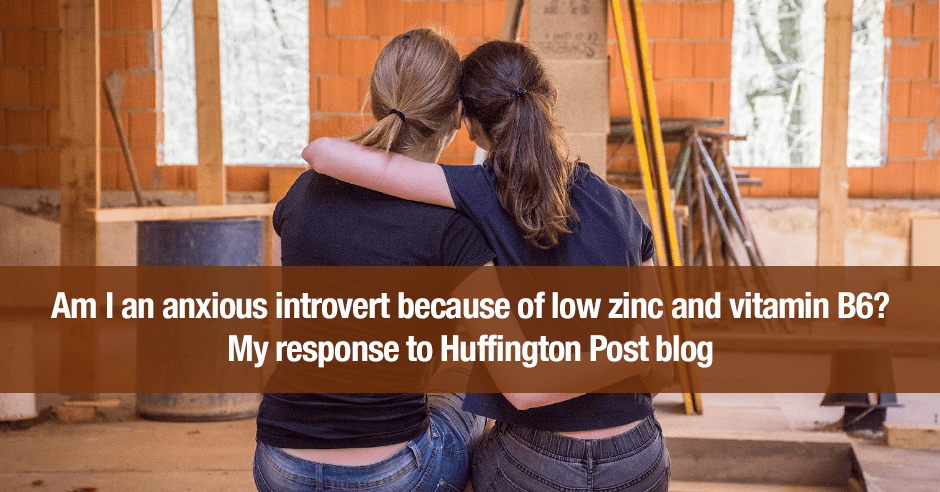
At the risk of making some introverts mad I’d like to propose a connection between pyroluria and introversion. Many of your introversion traits – anxiety-and-social-anxiety, feelings-of-inner-tension, not-enjoying-crowds – may in fact have a biochemical component.
There is a genetic condition that causes anxiety-and-social-anxiety, feelings-of-inner-tension, not-enjoying-crowds and it’s called pyroluria. If you have pyroluria and take zinc, vitamin B6, evening primrose oil and a few other nutrients you will feel calm, gain confidence and enjoy being around groups of people for the first time in your life. Perhaps the same can be said if you are an introvert and you feel uncomfortable in crowds and feel anxious!?
I’m writing this blog post because of a recent Huffington Post article, written by Carolyn Gregoire and called “23 Signs You’re Secretly An Introvert”
I am fascinated and intrigued with this article and the 23 questions because I used to resonate with being an introvert. However, since I discovered that I actually have an inherited and little-understood condition called pyroluria, I no longer resonate with being an introvert! I use zinc, vitamin B6 and evening primrose oil on a daily basis and it keeps my social anxiety/inner tension/inner monologue symptoms in check. And, it seems, my former introvert traits too!
I mention the “making some introverts mad” part because many introverts say “just leave us alone, we’re quite happy the way we are and don’t need to fixed or changed”.
But, based on the numerous comments on this very popular article– over 2500 in total as of 9/16/2013 – there are some aspects of being an introvert that many introverts would like to change.
Here are a few examples:
mr070995 is proud to be an introvert but wishes he was a little more outgoing:
“After reading this, and laughing at the fact that most of what is on this list is literally my life, I can definitely say I am an introvert. Am I sad by this, not at all! I am proud of what I am and what I’m becoming. Do I wish I was a little bit more outgoing in some aspects, of course”
junkmama2 is happy but not comfortable in a crowd:
“This is my life. It isn’t always a comfortable place to be when I must be in a crowd. But I am happy to be in my peaceful life, where calmness and quiet prevail”
HuffPoRepublican feels drained and anxious around people:
“I’m not sure what I am. I mean, I actually like to be around people at first, and I’m always up to hang out – but after the first five minutes, I feel drained and anxious to get home and return to my books. :)”
Darkace puts on a show in order to succeed in the work place:
“The hardest aspect of living life as in introvert is we all live in an extroverted world. School pushes kids to do group projects, that are just awkward and when you don’t do well in it you’re doing something wrong or something is wrong with you. The moment I step out of the door I am no longer me, I am a character that has to put on a show in order to succeed in the work place.”
BCereus fakes it when around friends and finds it painful:
“Sometimes I can communicate with friends well and sometimes I fake it really badly. I always wonder if people can see past my half smile and fake laugh. It’s painful to be honest. But there are times when I don’t mind so much.”
Here are the 23 questions in Carolyn’s article. I encourage to check them out on the blog as she goes into each one in more detail and has some great links for further reading on the topic.
1. You find small talk incredibly cumbersome.
2. You go to parties -– but not to meet people. You would rather spend time with people you already know and feel comfortable around.
3. You often feel alone in a crowd.
4. Networking/small-talk makes you feel like a phony.
5. You’ve been called “too intense.”
6. You’re easily distracted and overwhelmed in environments with an excess of stimulation.
7. Downtime doesn’t feel unproductive to you.
8. Giving a talk in front of 500 people is less stressful than having to mingle with those people afterwards.
9. When you get on the subway, you sit at the end of the bench -– not in the middle.
10. You start to shut down after you’ve been active for too long.It’s likely because you’re trying to conserve energy.
11. You’re in a relationship with an extrovert.
12. You’d rather be an expert at one thing than try to do everything.
13. You actively avoid any shows that might involve audience participation.
14. You screen all your calls — even from friends.
15. You notice details that others don’t.
16. You have a constantly running inner monologue.
17. You have low blood pressure.
18. You’ve been called an “old soul” -– since your 20s.
19. You don’t feel “high” from your surroundings
20. You look at the big picture.
21. You’ve been told to “come out of your shell.”
22. You’re a writer.
23. You alternate between phases of work and solitude, and periods of social activity.
Additional resources when you are new to pyroluria (and using amino acids)
Here is the pyroluria questionnaire.
Many of my clients with pyroluria also have neurotransmitter imbalances so we use the the neurotransmitter symptoms questionnaire to figure out if low serotonin or low GABA or low endorphins or low dopamine or low blood sugar may be an issue too. Keep in mind that the pyroluria nutrients also help with neurotransmitter production.
If you suspect pyroluria and low levels of any of the neurotransmitters and do not yet have my book, The Antianxiety Food Solution – How the Foods You Eat Can Help You Calm Your Anxious Mind, Improve Your Mood, and End Cravings, I highly recommend getting it and reading it before jumping in and using the pyroluria protocol and amino acids on your own so you are knowledgeable. And be sure to share it with the practitioner/health team you or your loved one is working with.
There is an entire chapter on pyroluria and another chapter on the amino acids. There are also chapters on gut health, gluten, blood sugar control, sugar cravings, and more.
The book doesn’t include product names (per the publisher’s request) so this blog, The Antianxiety Food Solution Amino Acid and Pyroluria Supplements, lists the pyroluria supplements and the amino acids that I use with my individual clients and those in my group programs.
If, after reading this blog and my book, you don’t feel comfortable figuring things out on your own (i.e. doing the symptoms questionnaire and respective amino acids trials), a good place to get help is the GABA QuickStart Program (if you have low GABA symptoms too). This is a paid online/virtual group program where you get my guidance and community support.
If you are a practitioner, join us in The Balancing Neurotransmitters: the Fundamentals program. This is also a paid online/virtual program with an opportunity to interact with me and other practitioners who are also using the amino acids.
I’d love to hear from you if you resonate with being an introvert and the 23 questions in Carolyn’s article (listed above). Please comment below and tell us which of the introvert qualities you identify with? numbers are fine – so for example, just say #s 1, 4,5,6,7,8, 13-18, 20-23 = total of 18
Would you please also take a look at the pyroluria questionnaire and share how you score? Again, which numbers and total score. I acknowledge that this may not apply to all introverts but I would love to know how prevalent this is.
If you are an introvert and struggle with crowds or networking, feel anxious and have a busy mind and inner monologue, you may possibly find some relief with the pyroluria protocol. Let us know if the pyroluria nutrients have helped you and how much of each helps.
If you’re a practitioner do you see this connection with your clients/patients who are introverts?
Feel free to share and ask your questions below.
